dare作情态动词和实义动词的用法区别
dare的用法和短语例句

dare的用法和短语例句【篇一】dare的用法dare的用法1:dare用作实义动词时,有时态和人称的变化,用do, does或did来构成否定句或疑问句。
dare的用法2:dare作“敢”解时,指“勇敢”,含有大胆、鲁莽、爱冒险,或因爱慕虚荣而甘冒生命或受惩罚的危险的意味,后面通常接动词不定式,有时可省略不定式符号to。
一般不用于进行体。
dare的用法3:dare还有“激某人做难办的事”的意思,即问某人敢不敢(或能不能)做某事,暗示他不敢(或不能),其后接以动词不定式充当补足语的复合宾语,不定式中的to 一般不省略。
dare的用法4:dare还可作“冒险,面对危难而不畏惧”解,直接接宾语,这是不常见的用法。
dare的用法5:dare用作情态动词,一般用于疑问句、否定句或条件句,或与hardly, never, no one, nobody等连用。
有时态变化,但没有人称形式的变化,其后接动词原形。
构成疑问句和否定句时不用助动词do。
dare的用法6:dare的否定式有时可用来指过去的事情。
dare的用法7:现代英语中dare的使用已趋减少,人们常用not to be afraid或not to have the courage to代替。
dare的用法8:表示“在激将法的鼓动下”用for a dare是英式英语用法,用on a dare是美式英语用法。
【篇二】dare的常用短语用作助动词 (aux.)how dare...I dare sayyou dare〔don’t you dare〕【篇三】dare的用法例句1. People always think I’m a fool, and I dare say they’re right.人们总认为我是个傻瓜,想必他们是对的。
2. Don’t speak to me like that. Don’t you dare.不要那样跟我讲话。
我不允许!3. When found, the children said they’d run away for a dare.找到这些孩子时,他们说自己是受了激将才出走的。
dare用法
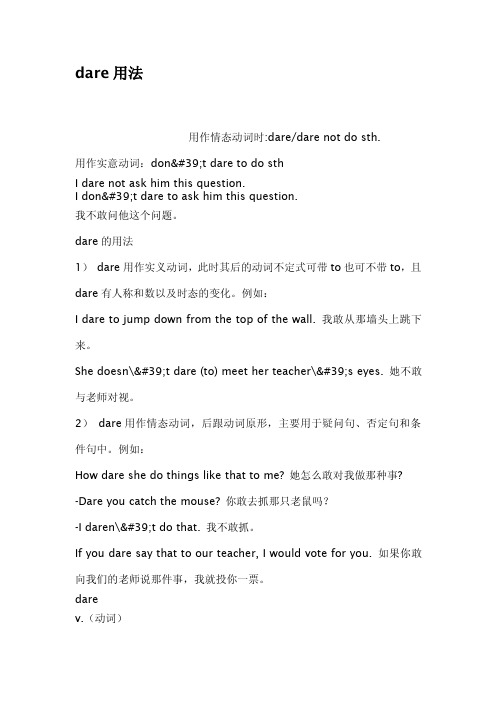
dare用法用作情态动词时:dare/dare not do sth.用作实意动词:don't dare to do sthI dare not ask him this question.I don't dare to ask him this question.我不敢问他这个问题。
dare的用法1)dare用作实义动词,此时其后的动词不定式可带to也可不带to,且dare有人称和数以及时态的变化。
例如:I dare to jump down from the top of the wall.我敢从那墙头上跳下来。
She doesn\'t dare(to)meet her teacher\'s eyes.她不敢与老师对视。
2)dare用作情态动词,后跟动词原形,主要用于疑问句、否定句和条件句中。
例如:How dare she do things like that to me?她怎么敢对我做那种事?-Dare you catch the mouse?你敢去抓那只老鼠吗?-I daren\'t do that.我不敢抓。
If you dare say that to our teacher,I would vote for you.如果你敢向我们的老师说那件事,我就投你一票。
darev.(动词)dared,dar.ing,daresv.t(及物动词)To have the courage required for:敢:有要求达到的胆量:The gymnast dared a breathtakingly difficult move.这位体操选手敢于做惊险的高难度动作To challenge(someone)to do something requiring boldness:挑衅:挑起(某人)去做要求勇敢的事:They dared me to dive off the high board.他们挑衅我从高台上跳下水中To confront or oppose boldly;defy.See Synonyms at defy向…挑战:勇敢地面对或反对;公然反抗参见defyv.intr.(不及物动词)To be courageous or bold enough to do or try something:勇于,胆敢:有足够的勇气或胆量做或试着做某事:Go ahead and dive if you dare.如果你敢,尽管跳下水去v.aux.(助动词)To be courageous or bold enough to:胆敢:有足够的勇气和胆量:I dare not say.How dare she go?我不敢说。
dare的两种用法

dare的两种用法Dare的意思是“有勇气做某事”,它也有两种用法:dare 作实义动词* as an ordinary verb followed by an infinitive with to, with s in the third personsingular and with questions and negatives formed with do:作为实义动词时,接带to的不定式,第三人称单数作主语时加s,疑问句和否定句用do来构成:He never dares to criticise her for wasting money and she doesn't dare to interrupt him when he's working.他从不敢批评她浪费钱,而她不敢打扰他工作。
dare 作情态动词作为情态助动词时,接不带to的不定式,第三人称单数作主语时不加s,疑问句和否定句不需要用do来构成:Dare she tell him what she thinks about him? She daren't say anything. He will only shout at her. "How dare you speak to me like that?" he will say.她敢告诉他她对他的想法吗?她什么也不敢说。
他只会对着她咆哮:“你怎敢那样对我说话?”他肯定会这么说。
比较Differences in use are not as fixed or clear cut between doesn't dare to and daren't as they are between doesn't need to and needn't,except in expressions or collocations such as:doesn't dare to与daren't在用法上的差别不像doesn't need to和needn't那么固定或清晰,除了在以下这些表达和搭配中:* How dare you?你怎么敢?eg: How dare you walk away when I'm talking to you?我在跟你说话的时候你怎么敢走开?* Idare you to…我谅你不敢……I dare you to go up to him and ask him for a date.我谅你也不敢走到他面前请他跟你约会。
dare的用法和短语例句
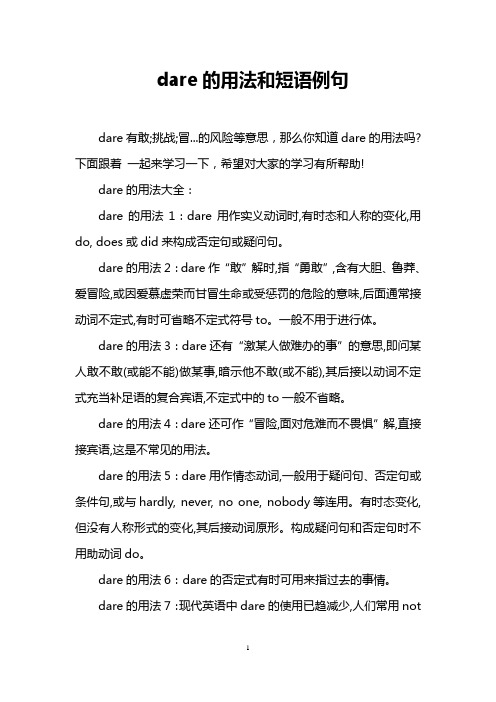
dare的用法和短语例句dare有敢;挑战;冒...的风险等意思,那么你知道dare的用法吗?下面跟着一起来学习一下,希望对大家的学习有所帮助!dare的用法大全:dare的用法1:dare用作实义动词时,有时态和人称的变化,用do, does或did来构成否定句或疑问句。
dare的用法2:dare作“敢”解时,指“勇敢”,含有大胆、鲁莽、爱冒险,或因爱慕虚荣而甘冒生命或受惩罚的危险的意味,后面通常接动词不定式,有时可省略不定式符号to。
一般不用于进行体。
dare的用法3:dare还有“激某人做难办的事”的意思,即问某人敢不敢(或能不能)做某事,暗示他不敢(或不能),其后接以动词不定式充当补足语的复合宾语,不定式中的to一般不省略。
dare的用法4:dare还可作“冒险,面对危难而不畏惧”解,直接接宾语,这是不常见的用法。
dare的用法5:dare用作情态动词,一般用于疑问句、否定句或条件句,或与hardly, never, no one, nobody等连用。
有时态变化,但没有人称形式的变化,其后接动词原形。
构成疑问句和否定句时不用助动词do。
dare的用法6:dare的否定式有时可用来指过去的事情。
dare的用法7:现代英语中dare的使用已趋减少,人们常用notto be afraid或not to have the courage to代替。
dare的用法8:表示“在激将法的鼓动下”用for a dare是英式英语用法,用on a dare是美式英语用法。
dare的常用短语:用作助动词(aux.)how dare...I dare sayyou dare〔don't you dare〕dare的用法例句:1. People always think I'm a fool, and I dare say they're right.人们总认为我是个傻瓜,想必他们是对的。
dare的两种用法
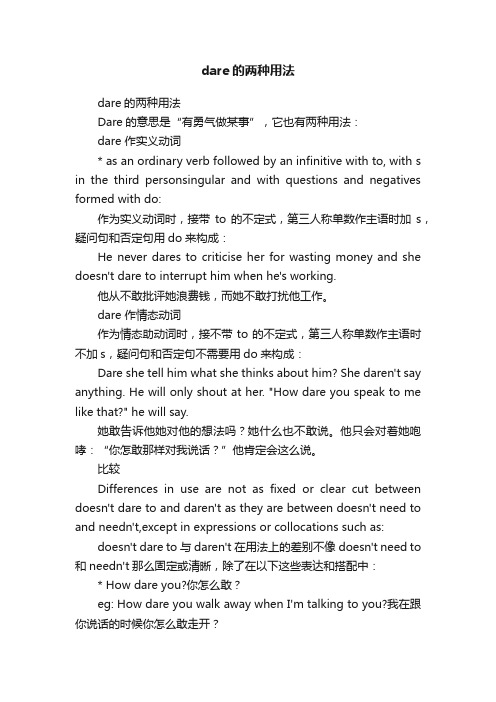
dare的两种用法dare的两种用法Dare的意思是“有勇气做某事”,它也有两种用法:dare 作实义动词* as an ordinary verb followed by an infinitive with to, with s in the third personsingular and with questions and negatives formed with do:作为实义动词时,接带to的不定式,第三人称单数作主语时加s,疑问句和否定句用do来构成:He never dares to criticise her for wasting money and she doesn't dare to interrupt him when he's working.他从不敢批评她浪费钱,而她不敢打扰他工作。
dare 作情态动词作为情态助动词时,接不带to的不定式,第三人称单数作主语时不加s,疑问句和否定句不需要用do来构成:Dare she tell him what she thinks about him? She daren't say anything. He will only shout at her. "How dare you speak to me like that?" he will say.她敢告诉他她对他的想法吗?她什么也不敢说。
他只会对着她咆哮:“你怎敢那样对我说话?”他肯定会这么说。
比较Differences in use are not as fixed or clear cut between doesn't dare to and daren't as they are between doesn't need to and needn't,except in expressions or collocations such as: doesn't dare to与daren't在用法上的差别不像doesn't need to 和needn't那么固定或清晰,除了在以下这些表达和搭配中:* How dare you?你怎么敢?eg: How dare you walk away when I'm talking to you?我在跟你说话的时候你怎么敢走开?* Idare you to…我谅你不敢……I dare you to go up to him and ask him for a date.我谅你也不敢走到他面前请他跟你约会。
dare的用法总结5种
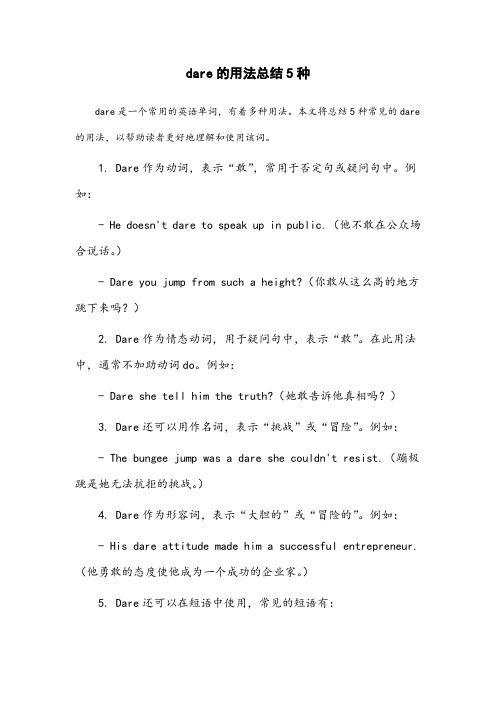
dare的用法总结5种dare是一个常用的英语单词,有着多种用法。
本文将总结5种常见的dare 的用法,以帮助读者更好地理解和使用该词。
1. Dare作为动词,表示“敢”,常用于否定句或疑问句中。
例如:- He doesn't dare to speak up in public.(他不敢在公众场合说话。
)- Dare you jump from such a height?(你敢从这么高的地方跳下来吗?)2. Dare作为情态动词,用于疑问句中,表示“敢”。
在此用法中,通常不加助动词do。
例如:- Dare she tell him the truth?(她敢告诉他真相吗?)3. Dare还可以用作名词,表示“挑战”或“冒险”。
例如:- The bungee jump was a dare she couldn't resist.(蹦极跳是她无法抗拒的挑战。
)4. Dare作为形容词,表示“大胆的”或“冒险的”。
例如:- His dare attitude made him a successful entrepreneur.(他勇敢的态度使他成为一个成功的企业家。
)5. Dare还可以在短语中使用,常见的短语有:- Daredevil:冒险家- Double dare:双倍挑战- I dare say:我敢说总结:通过以上总结,我们了解到了dare的5种常见用法。
作为动词,dare可以表示“敢”,作为情态动词则用于疑问句中表示“敢”。
此外,dare还可以作为名词表示“挑战”或“冒险”,作为形容词表示“大胆的”或“冒险的”。
在短语中,我们还可以见到一些常用的与dare相关的短语。
Need和dare的用法小结与练习含答案

Need/Dare的用法与练习(含答案)Need的用法1. need作情态动词need作情态动词用时,主要用于否定句和疑问句中,形式为need not+原形动词。
(need 辅助后面实义动词,有一定的词义,但不能独立使用)例:宾语+ 状语注意用need 提问时,肯定回答为must,否定回答为needn’t或don’t have to。
例:—Need I finish the work today? (need助动词)—Yes, you must .是的。
—No. you needn’t /don’t have to. 不,你不必。
2. need作实义动词作实义动词,need和普通动词一样,有人称、数和时态的变化,后接名词、代词、不定式或动名词做宾语,可用于任何句子。
need肯定陈述句中独立做谓语,而疑问和否定则要借助于do构成。
如:Do you need a dictionary? 你需要词典吗?1)如果主语是人,句型如下:sb. need(s) sth. 某人需要某物sb. need to do sth. 某人需要去做某事例:I need to pass the exam. 我需要通过这次考试。
He needs to learn English .他需要学习英语。
You need my help.主语+2)如果主语为某物某物需要某种方法处理时,need之后可接不定式短语,但一定为被动语态;也接doing,但一定为主动语态。
句型如下:Sth. need doing 某事需要被做= need to be done特别注意两点:①.主动形式的动名词doing具有被动的含义;也接动名词,但一定为主动语态。
②.该动名词可以改为其动词不定式的被动形式而句子的意义不变。
例如:.例:The flowers need watering.= The flowers need to be watered. 这些花需要浇水。
dare作情态动词和实义动词的用法区别
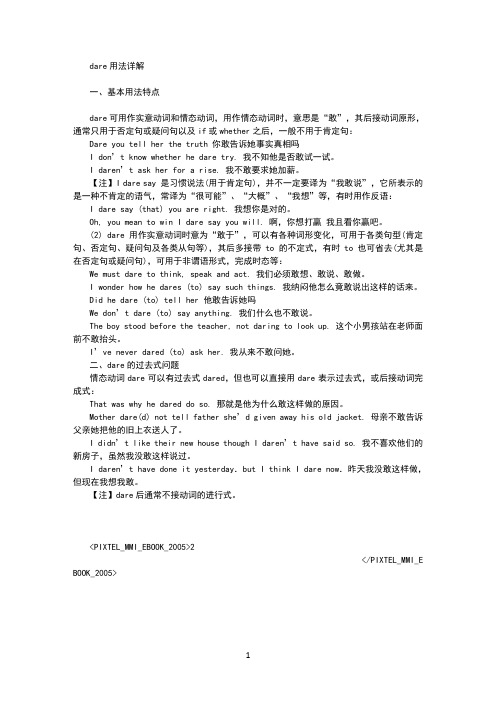
dare用法详解一、基本用法特点dare可用作实意动词和情态动词,用作情态动词时,意思是“敢”,其后接动词原形,通常只用于否定句或疑问句以及if或whether之后,一般不用于肯定句:Dare you tell her the truth 你敢告诉她事实真相吗I don’t know whether he dare try. 我不知他是否敢试一试。
I daren’t ask her for a rise. 我不敢要求她加薪。
【注】I dare say 是习惯说法(用于肯定句),并不一定要译为“我敢说”,它所表示的是一种不肯定的语气,常译为“很可能”、“大概”、“我想”等,有时用作反语:I dare say (that) you are right. 我想你是对的。
Oh, you mean to win I dare say you will. 啊,你想打赢我且看你赢吧。
(2) dare用作实意动词时意为“敢于”,可以有各种词形变化,可用于各类句型(肯定句、否定句、疑问句及各类从句等),其后多接带 to 的不定式,有时 to 也可省去(尤其是在否定句或疑问句),可用于非谓语形式,完成时态等:We must dare to think, speak and act. 我们必须敢想、敢说、敢做。
I wonder how he dares (to) say such things. 我纳闷他怎么竟敢说出这样的话来。
Did he dare (to) tell her 他敢告诉她吗We don’t dare (to) say anything. 我们什么也不敢说。
The boy stood before the teacher, not daring to look up. 这个小男孩站在老师面前不敢抬头。
I’ve never dared (to) ask her. 我从来不敢问她。
二、dare的过去式问题情态动词dare可以有过去式dared,但也可以直接用dare表示过去式,或后接动词完成式:That was why he dared do so. 那就是他为什么敢这样做的原因。
- 1、下载文档前请自行甄别文档内容的完整性,平台不提供额外的编辑、内容补充、找答案等附加服务。
- 2、"仅部分预览"的文档,不可在线预览部分如存在完整性等问题,可反馈申请退款(可完整预览的文档不适用该条件!)。
- 3、如文档侵犯您的权益,请联系客服反馈,我们会尽快为您处理(人工客服工作时间:9:00-18:30)。
dare用法详解
一、基本用法特点
dare可用作实意动词和情态动词,用作情态动词时,意思是“敢”,其后接动词原形,通常只用于否定句或疑问句以及if或whether之后,一般不用于肯定句:
Dare you tell her the truth? 你敢告诉她事实真相吗?
I don’t know whether he dare try. 我不知他是否敢试一试。
I daren’t ask her for a rise. 我不敢要求她加薪。
【注】I dare say 是习惯说法(用于肯定句),并不一定要译为“我敢说”,它所表示的是一种不肯定的语气,常译为“很可能”、“大概”、“我想”等,有时用作反语:
I dare say (that) you are right. 我想你是对的。
Oh, you mean to win? I dare say you will. 啊,你想打赢? 我且看你赢吧。
(2) dare用作实意动词时意为“敢于”,可以有各种词形变化,可用于各类句型(肯定句、否定句、疑问句及各类从句等),其后多接带to 的不定式,有时to 也可省去(尤其是在否定句或疑问句),可用于非谓语形式,完成时态等:
We must dare to think, speak and act. 我们必须敢想、敢说、敢做。
I wonder how he dares (to) say such things. 我纳闷他怎么竟敢说出这样的话来。
Did he dare (to) tell her? 他敢告诉她吗?
We don’t dare (to) say anything. 我们什么也不敢说。
The boy stood before the teacher, not daring to look up. 这个小男孩站在老师面前不敢抬头。
I’ve never dared (to) ask her. 我从来不敢问她。
二、dare的过去式问题
情态动词dare可以有过去式dared,但也可以直接用dare表示过去式,或后接动词完成式:That was why he dared do so. 那就是他为什么敢这样做的原因。
Mother dare(d) not tell father she’d given away his old jacket. 母亲不敢告诉父亲她把他的旧上衣送人了。
I didn’t like their new house though I daren’t have said so. 我不喜欢他们的新房子,虽然我没敢这样说过。
I daren’t have done it yesterday.but I think I dare now.昨天我没敢这样做,但现在我想我敢。
【注】dare后通常不接动词的进行式。
<PIXTEL_MMI_EBOOK_2005>2
</PIXTEL_MMI_EBOOK_2005>。
